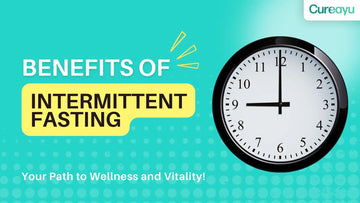Intermittent fasting has gained widespread attention for its potential health benefits, particularly in aiding weight loss and improving overall well-being. It involves cycling between periods of eating and fasting, and its flexibility has made it a popular choice for many looking to transform their health. Let’s delve deeper into this powerful dietary strategy.
What is Intermittent Fasting?
- Intermittent fasting is not a diet but an eating pattern that cycles between periods of eating and fasting.
- It doesn’t dictate what foods to eat but rather when to eat them.
- Common methods include the 16/8 method, Eat-Stop-Eat, and the 5:2 diet.
- It taps into the body’s natural metabolic processes, promoting fat burning and cellular repair during the fasting phase.
- It’s flexible and adaptable, allowing individuals to choose a method that suits their lifestyle.
Also Read: Understanding the Importance of Physical Fitness for Well-being
Intermittent Fasting Benefits
- Weight loss: By restricting the eating window, it can lead to a calorie deficit, aiding weight loss.
- Improved insulin sensitivity: Helps regulate blood sugar levels and reduce the risk of type 2 diabetes.
- Enhanced cellular repair: Initiates autophagy, a process where cells remove dysfunctional components, promoting cellular health.
- Increased energy: Some report heightened mental clarity and increased energy levels during fasting periods.
- Longevity: Studies suggest potential benefits in extending lifespan and reducing the risk of age-related diseases.
- Hormonal balance: May positively impact hormones related to hunger and satiety, aiding appetite control.
Intermittent Fasting for Weight Loss
- Creates a calorie deficit: Restricts eating windows, naturally reducing overall calorie intake.
- Boosts metabolism: Can lead to increased fat burning due to hormonal changes during fasting.
- Reduces belly fat: Particularly effective in targeting stubborn abdominal fat.
- Preserves muscle mass: Studies indicate that intermittent fasting helps retain muscle while losing fat.
- Encourages mindful eating: Promotes awareness of hunger cues and encourages more mindful food choices.
- Can break weight loss plateaus: Offers a different approach for those who have stalled in their weight loss journey.
Also Read: The Ultimate Guide to Ayurvedic Herbs and Their Remarkable Benefits
Intermittent Fasting Diet
- No specific foods are off-limits: Focuses more on when to eat rather than what to eat.
- Encourages whole, nutrient-dense foods: Emphasizes the importance of quality nutrition during eating periods.
- Hydration is key: Drinking water, herbal tea, or black coffee is often allowed during fasting periods.
- Consistency matters: Sticking to a regular fasting schedule can yield better results.
- Individual adaptability: Different methods suit different lifestyles, allowing for personalization.
- Patience and persistence: Results may vary, and it’s essential to give the body time to adjust.
Intermittent Fasting Rules
- Choose a method that suits you: Experiment with different fasting schedules to find what works best.
- Stay hydrated: Drink plenty of water, especially during fasting periods.
- Start gradually: Begin with shorter fasting windows and gradually increase them as your body adapts.
- Be mindful of food choices: Focus on nutrient-dense foods to make the most of eating periods.
- Listen to your body: Pay attention to hunger cues and adjust fasting windows accordingly.
- Consult a healthcare professional: Especially if you have underlying health conditions or concerns.
Also Read: Optimizing Health with Testosterone: Natural Boosters and Ayurvedic Insights
Conclusion
Intermittent fasting is a versatile and effective tool for weight loss and overall health improvement. Its numerous benefits, including weight management, enhanced metabolism, and cellular repair, make it an attractive option for those seeking a sustainable approach to wellness. Remember, while intermittent fasting can be beneficial, it’s essential to approach it with mindfulness, ensuring it aligns with your individual needs and health goals.












